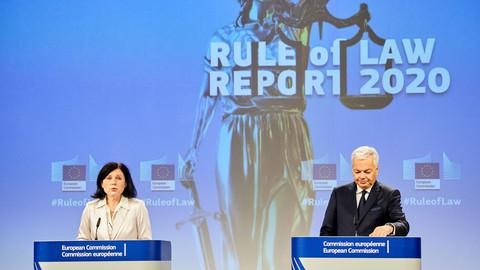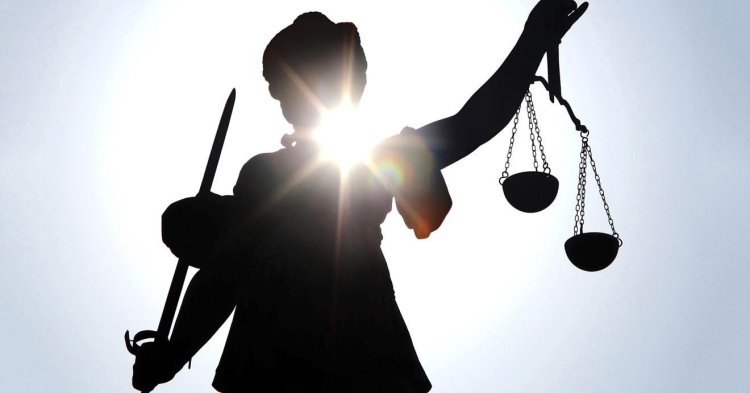Member States disregarding EU values and rule-of-law standards have caused growing irritations within the union over the past years. Just days ago, one of the many legal battles over the blocs core principles reached a preliminary peak, when the European Court of Justice (ECJ) found Hungary to be in breach of EU law for the third time this year.
One in a long series of spats
The ECJ’s decision is unlikely to ease tensions between Brussels and Budapest as it adds to a long list of contentious issues. Diverging views on how to safeguard rule of law and protect European funds have been at the heart of the conflict, in which Hungary and its V4-partner Poland have often denounced what they see as unfair treatment by EU institutions.
Last week, the conflict between the two sides erupted again, after Commission Vice President Vera Jourova had presented the EU’s first report on the rule of law. The report is an indicator of the unions renewed efforts to defend its basic principles, and assesses Member States’ adherence to democratic standards. Hungary and Poland are among the countries that were found to fall short of a number of these standards, such as a fully independent judiciary and solid anti-corruption regulations. When presenting the reports’ key findings, Commissioner Jourova admitted that the EU had been “naive in the past" and condemned Hungary’s ruling FIDESZ party for building what she called an “ill democracy” (alluding to Orbán’s idea of an ‘illiberal democracy’).

Outrage from Hungary was imminent, with the Prime Minister even calling for Commissioner Jourova to resign over her “derogatory comments”. Ahead of the report, the country had already announced it would join forces with Poland to set up an institute assessing rule of law in other EU-countries, as a counter-weight to the “double standards” they accuse Brussels of applying.
Slow Article 7 procedures
Both Hungary and Poland are facing procedures related to Article 7 of the Treaty of the European Union, often called “the EU’s nuclear option” as it can lead to the suspension of a Member State’s voting rights. The procedures address potential breaches of EU values, but they have been dragging on for years and sanctions require a unanimous decision in the Council – a situation which has led to calls by the European Parliament (EP) for a more effective tool to hold member states accountable.
In July, the 27 EU leaders and the EP seemed to have taken a step in this direction, when they agreed to make the distribution of funds dependent on the fulfillment of European principles. This would be a mechanism based on the simple idea of conditionality: withhold money from Member States as long as they are in breach of EU values. But negotiating the specifics of this procedure between the Parliament and the Council has proven near impossible so far.
Conditionality and regular reports as a solution
The rule-of-law mechanism would build on the recommendations of the rule-of-law report and is envisioned to be a stricter disciplinary response to such issues within the EU, as it could lead to funds being blocked. Katharina Barley, Vice President of the EP, sees this conditionality as the EU’s “last chance” to address systemic issues in Member States. In an interview with German broadcaster DLF she also explained that the report and mechanism apply to all member states equally, thus countering what she sees as a “West-against-East” narrative often used by Member States in the east. She also pointed out that while many Member States have room for improvement, the systematic dismantling of state institutions is peculiar to only a few, including Hungary and Poland.
As both countries are able to block decisions in the Council – and through this, the budget and the corona-aid package – negotiations are proving difficult, despite a solid, cross-fraction parliamentary majority in favour of a strong rule-of-law conditionality.
Germany’s proposal – toothless tiger or pragmatic compromise?
Germany, currently holding the presidency of the European Council, has recently submitted an approach to a possible solution to the current negotiation deadlock. Its proposal would not give Hungary and Poland the veto rights they are demanding, but at the same time limit any sanctions to rule-of-law breaches that directly affect EU funds.
France and the Netherlands have made clear that they hope for stronger rules, and MEPs have criticised Germany for watering down the tool too far for it to be effective. They fear that a narrow definition of the rule of law would leave too many violations of EU standards unpunished: “the barrier is so high for this mechanism that we know there would never be consequences” Daniel Freund, MEP for the Greens and anti-corruption expert, said. Other MEPs have argued that the mechanism will hardly ever be triggered and could end up serving those it is supposed to sanction.
But the German proposal has not been to the liking of the Hungarian government, either, who have called it an unacceptable unilateral modification of EU-treaties, amounting to “blackmail”.
Searching for reasons behind Germany’s seeming unwillingness to take the gloves off in this struggle, some have looked towards the economic ties between Hungary and Germany, especially in the automotive sector as German car manufacturers are a key pillar of Hungarian economy, but they also rely on the favourable production conditions offered. Another reason could be to keep Hungary’s FIDESZ in the EPP (where it is currently suspended), using that channel to prevent further radicalisation.
Is Europe missing its match-point?
With further tough negotiations ahead, it remains unclear whether proponents of stricter sanctions will emerge victorious. If they don’t, the EU might well have missed its last chance to rein in rogue member states – it would mean seven more years and billions of euros for governments who seem to treat basic EU standards and values as something optional, for lack of substantial sanctions.
A Hungarian political analyst used a sports metaphor when describing the conflict recently: “EU politicians are preparing for an elegant tennis match, and then Viktor Orbán, the boxer comes in and opens with a left hook.” While the nuances of this comparison might be argued about, it captures the essence of the challenge of using democratic principles against an actor who disregards them.
For the sake of its financial interests, its political credibility and in the interest of citizens who believe in the European project, the EU should not miss the chance to defend the values it claims to stand for.


Follow the comments: |
|
